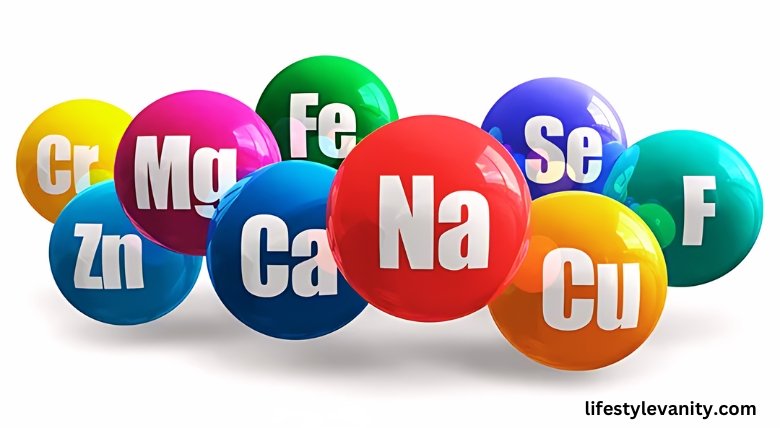Introduction:
Minerals are vital nutrients that play a critical role in maintaining the health and function of the human body. These inorganic elements are necessary for a wide range of physiological processes, from bone formation and muscle contraction to nerve function and energy production. Despite being required in relatively small amounts, minerals are indispensable for overall well-being.
What Are Minerals?
Minerals are naturally occurring inorganic substances that are essential for various bodily functions. Unlike vitamins, which are organic and can be synthesized by plants and animals, Organisms‘ minerals are inorganic and must be obtained from the diet. They are classified into two main categories based on the amounts the body needs:
macrominerals and trace minerals.
Macrominerals are needed in larger quantities (more than 100 milligrams per day) and include:
Calcium: Vital for bone and teeth health, muscle function, nerve signaling, and blood clotting.
Phosphorus: Important for the formation of bones and teeth, energy production, and cell repair.
Magnesium: Involved in over 300 enzymatic reactions, including energy production, DNA synthesis, and muscle contraction.
Sodium: Essential for fluid balance, nerve function, and muscle contractions.
Potassium: Crucial for maintaining fluid balance, nerve signals, and muscle contractions.
Chloride: Helps maintain fluid balance and is a component of stomach acid, aiding in digestion.
Sulfur: Integral to certain amino acids and vitamins, and is involved in detoxification and protein synthesis.

Trace Minerals
Trace minerals are required in smaller amounts (less than 100 milligrams per day) and include:
Iron: Necessary for the production of hemoglobin, which carries oxygen in the blood.
Zinc: Supports immune function, wound healing, DNA synthesis, and cell division.
Copper: Involved in iron metabolism, the formation of connective tissue, and brain function.
Manganese: Plays a role in bone formation, blood clotting, and metabolism.
Iodine: Essential for the production of thyroid hormones, which regulate metabolism.
Selenium: Acts as an antioxidant, protecting cells from damage and supporting immune function.
Fluoride: Important for the maintenance of bone and dental health.
Chromium: Involved in the regulation of blood sugar levels.
Molybdenum: Necessary for the function of certain enzymes involved in detoxification and metabolism.

Sources of Minerals
Minerals are found in a variety of foods, and a balanced diet typically provides adequate amounts of these essential nutrients. Here are some common dietary sources of key minerals:
Calcium: Dairy products (milk, cheese, yogurt), leafy green vegetables (kale, broccoli), fortified plant-based milks, and fish with bones (sardines, salmon).
Phosphorus: Meat, poultry, fish, dairy products, eggs, nuts, seeds, and whole grains.
Magnesium: Nuts (almonds, cashews), seeds (pumpkin seeds), whole grains, legumes, leafy green vegetables, and dark chocolate.
Sodium: Table salt, processed foods, canned soups, and snack foods.
Potassium: Fruits (bananas, oranges), vegetables (potatoes, spinach), legumes, nuts, seeds, and dairy products.
Chloride: Table salt, seaweed, tomatoes, lettuce, and olives.
Sulfur: Protein-rich foods such as meat, fish, poultry, eggs, legumes, nuts, and cruciferous vegetables (broccoli, Brussels sprouts).

Trace Minerals Sources
Iron: Red meat, poultry, fish, legumes, fortified cereals, spinach, and lentils.
Zinc: Meat, shellfish, legumes, seeds, nuts, dairy products, and whole grains.
Copper: Shellfish, nuts, seeds, whole grains, beans, and dark chocolate.
Manganese: Nuts, seeds, whole grains, leafy green vegetables, and tea.
Iodine: Iodized salt, seaweed, fish, dairy products, and eggs.
Selenium: Brazil nuts, food chains, meat, poultry, eggs, and whole grains.
Fluoride: Fluoridated water, tea, and seafood.
Chromium: Broccoli, grapes, potatoes, garlic, basil, and meat.
Molybdenum: Legumes, grains, nuts, and leafy vegetables.
The Impact of Mineral Deficiencies
Mineral deficiencies can lead to various health problems, depending on which mineral is lacking. Here are some examples:
Calcium Deficiency: This can result in osteoporosis, characterized by weak and brittle bones, and an increased risk of fractures.
Iron Deficiency: This leads to anemia, causing fatigue, weakness, and impaired cognitive function.
Magnesium Deficiency: Can cause muscle cramps, mental disorders, osteoporosis, and high blood pressure.
Iodine Deficiency: Results in goiter (enlargement of the thyroid gland) and can cause developmental issues and hypothyroidism.
Zinc Deficiency: This leads to impaired immune function, hair loss, diarrhea, and delayed wound healing.
Selenium Deficiency: Can cause muscle weakness, heart disease, and a compromised immune system.
The Impact of Mineral Excess
While minerals are essential, excessive intake can also be harmful:
Calcium Excess: Can lead to kidney stones, impaired absorption of other minerals, and cardiovascular issues.
Iron Excess: Can cause liver damage, heart problems, and diabetes (a condition known as hemochromatosis).
Sodium Excess: Contributes to high blood pressure, heart disease, and stroke.
Potassium Excess: This can result in hyperkalemia, affecting heart function and potentially leading to cardiac arrest.
Fluoride Excess: Can cause dental fluorosis (discoloration of teeth) and skeletal fluorosis (pain and damage to bones and joints).

Tips for Ensuring Adequate Mineral Intake
To ensure you are getting the right balance of minerals, consider the following tips:
Eat a Balanced Diet: It is necessary to eat foods from different groups to ensure that you get the recommended minerals in your diet.
Choose Whole Foods: Ensure the consumption of whole, minimal processed foods for improved nutrient-dense foods.
Read Labels: Food labeling should also be considered when getting the amount of minerals contained in the food web.
Stay Hydrated: Take as many glasses of water as possible, especially if you live in an area with fluoridated water.
Consult a Healthcare Professional: If you have particular dietary requirements or health necessities, it is prudent to consult with a healthcare professional or a nutrition expert.
Conclusion
Essential minerals are also an indispensable portion of food and are vital for human wellness. A diet of whole foods from all food groups mostly ensures the quantity of these essential elements in the body. Being aware of minerals, their role, and sources, as well as the outcomes of their shortage or overload, you can conclude more wisely about the menu. On that note, review your dieting habits and incorporate the right minerals; be ready to enjoy good health for both your body and mind.
